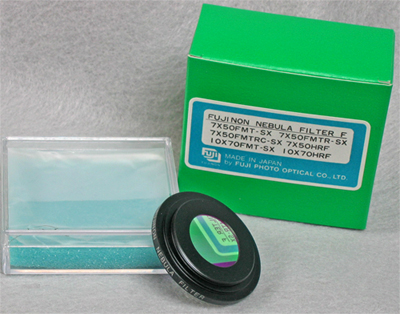Distribution
![]() Fujinon Index Page
Fujinon Index Page
![]() News
News ![]() Notes & Interesting Articles
Notes & Interesting Articles ![]() Pricing
Pricing ![]()

Fujinon Nebula Filter Set
 These are a helpful accessory when used with a telescope or fastened onto a binocular they help view or photograph some of the the very faint, deep sky objects outside our solar system including emission and planetary nebula. Nebula filters are often referred to as light pollution rejection filters, they are particularly beneficial for those who live near sky light polluted suburban areas where the sodium and mercury lighting cast a greenish or golden glow upon the otherwise transparent night sky. However, light pollution filters have benefitted observers located in darker rural settings.
These are a helpful accessory when used with a telescope or fastened onto a binocular they help view or photograph some of the the very faint, deep sky objects outside our solar system including emission and planetary nebula. Nebula filters are often referred to as light pollution rejection filters, they are particularly beneficial for those who live near sky light polluted suburban areas where the sodium and mercury lighting cast a greenish or golden glow upon the otherwise transparent night sky. However, light pollution filters have benefitted observers located in darker rural settings.
Right: One Fujinon Nebula Filter; these are sold by the pair as a set (110,640 Bytes).
Click on image to see enlarged view (213,154 bytes)
Nebula filters are made up of micron thin layers of materials deposited onto an otherwise transparent optical glass window. Light is composed of many wavelengths; the coatings on these filters are calculated to permit the transmitting of several desired wavelengths, while simultaneously rejecting a high percentage of those wavelengths emitted by common street lighting. The Nebula filter can not attenuate light from neon sources since these emit across a wide bandwidth. In a more perfected nebula filter a high percentage of light is transmitted in the desired wavelengths, as much as 80 to 90 percent being typical. And depending on the type of filter (broad or narrower band including Oxygen III filters) these filters pass light in the nebula lines which may include Oxygen III, Hydrogen Beta and Hydrogen Alpha regions of the spectrum. Narrower, and narrower bandpass filters become more and more specialized and may actually cut down the light coming from some of the brighter emission nebula; for example M42 the Great Nebula in Orion looks great with no filter, better with a broad band nebula filter, but much of the extended portions of the nebula disappear when observed with a very narrow band filter.
In the way these filters work, they will still absorb some light from desired object. Stars, star clusters and galaxies emit light from all wavelengths including those emitted by street lights. And so a pronounced darkening of these objects will be observed with the filter in place . However, since they darken the sky background it makes it easier to see the faint objects contrasted against the blacker background. The contrast boosting effects of the broad band nebula filters have been helpful in observing some subtle features on planets too - most notably Jupiter.
The Fujinon Nebula Filter is a coated glass broad band nebula filter installed into a cast and machined alloy bracket. There are versions made that are compatible with several of the Fujinon binoculars sold by Company Seven. To install the filter, simply unthread the binocular rubber eyecup with its metal frame, thread the filter into place over each eyepiece, then replace the rubber eyecups over the filters.
This is a specialized filter and requires careful handling and cautious cleaning. Please contact Company Seven if you have concerns about these aspects, we will be happy to clean it for you.
Fujinon Nebula Filter Specifications
| Filters Per Set | Two |
|---|---|
| Classification | Broad Band |
| Weight (each) | 0.4 oz / 10 g |
| Diameter of Element | 20.88 mm (0.82 inches) |
| Diameter of Cell | 43.98 mm (1.73 inches) |
* Specifications are subject to change without notice.
Contents Copyright 1998-2006 Company Seven All Rights Reserved